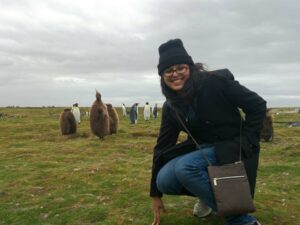POGO Alumnus:
(1) POGO-AMT Shipboard Training, 2013; (2) POGO-SCOR Visiting Fellowship, 2017
“In 2013, I was awarded the POGO AMT 2013 fellowship to participate on a research cruise from UK to Falkland Islands to carry out in-situ measurements along the Atlantic Meridional Transect (AMT). The fellowship was very well structured into three parts, to prepare for a research cruise, conduct scientific experiments on the cruise and finally process as well as analyse the data collected.”
In 2013, I was awarded the POGO AMT 2013 fellowship to participate on a research cruise from UK to Falkland Islands to carry out in-situ measurements along the Atlantic Meridional Transect (AMT). The fellowship was very well structured into three parts, to prepare for a research cruise, conduct scientific experiments on the cruise and finally process as well as analyse the data collected. Under the guidance of Dr. Gavin Tilstone, I learnt several aspects of conducting in-situ measurements, such as preparing for the noon CTD, calibration of flourometer used for estimating the size fractionated chlorophyll, analysing the size-fractionated chlorophyll, as well as PE curve fittings. As a student with limited oceanographic research experience, this period was extremely enriching for me in terms of the immense scientific knowledge and skills I gained on the cruise as well as during my time at PML .The fellowship also provided me with an unprecedented exposure to a multi-cultural, world-class scientific environment with numerous opportunities to interact with Ocean remote sensing experts. I have to add here that apart from the amazing academic exposure I got, my most memorable times during the cruise were during my interactions with Dr. Priscila Lange, Dr Giorgio Dall’Olmo and Dr. Bob Brewin, with the highlight being the equator crossing ceremony and my trip to the Volunteer Islands in The Falkland Islands, which was my national geographic moment.
Two years down the line, I finally joined IIT-Bombay for my doctoral research where my research objective was to work on the topic of bathymetry estimation using remote sensing techniques. My topic required expertise both in optical and microwave remote sensing and although I had a sound knowledge of the previous, I lacked in latter. Again, for me the POGO SCOR 2017 Fellowship worked exactly at the time when I most required it to make progress in my PhD topic. By virtue of this fellowship, I visited IFREMER, Brest, France where for 3 months I worked on the topic of Sun-glint Imagery for Ocean surface Waves under the guidance of Dr. Bertrand Chapron, who is an expert in the field of Satellite Oceanography. This was extremely benefiting as it helped me finally complete my PhD thesis successfully in 2019. The work done during this period was also presented by me in the SPIE Asia-Pacific Remote Sensing conference at Hawaii in 2018.
For me, both my POGO fellowship tenures had a great hand in shaping my career objectives as well as improving my expertise in the field of marine science. As a former POGO scholar, I greatly encourage early career researchers to apply and experience the POGO fellowships as they give you an opportunity to participate in world class science which is very important from the perspective of building a good academic career. Finally, I would like to extend my gratitude to POGO for playing a pertinent role in making me a good scientific researcher in the field of oceanography.

